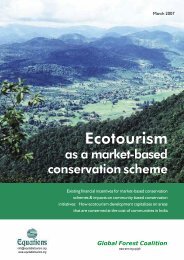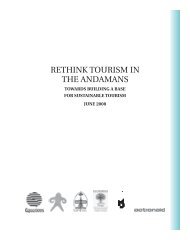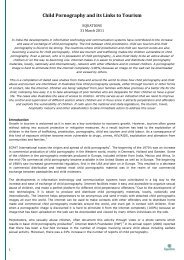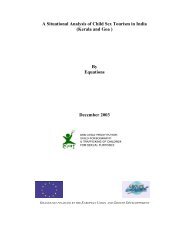Nilgiris Biosphere Reserve - Equitable Tourism Options
Nilgiris Biosphere Reserve - Equitable Tourism Options
Nilgiris Biosphere Reserve - Equitable Tourism Options
You also want an ePaper? Increase the reach of your titles
YUMPU automatically turns print PDFs into web optimized ePapers that Google loves.
some cases sand is pumped onshore and coastal-protection steps have to<br />
be taken. The use of traditional building materials such as wood or reef<br />
limestone for tourism related constructions could also pose problems when<br />
the use is from the ecosystems themselves and is excessive.<br />
The most severe destructions are caused by untreated sewage,<br />
inadequate garbage removal and excessive water consumption. It is<br />
beyond any iota of doubt that pollution from sewage is one of tourism's<br />
biggest problems, as it can scarcely be confined spatially, and the changes<br />
in the nutrient balance it causes inflict extensive damage on the impacted<br />
aquatic habitats. This is particularly true of hill and mountain streams.<br />
Solid waste is another major problem, especially in developing countries<br />
where there are hardly any capacities for regulated disposal. The problem<br />
is further aggravated by the rampant use of non-biodegradable and toxic<br />
wastes like plastics.<br />
Water consumption by tourists and tourism facilities amounts to many<br />
times, sometimes up to ten times, the minimum domestic requirement.<br />
Only a least portion of this amount is taken up by drinking water. Water is<br />
used primarily for showers, swimming pools and watering gardens and golf<br />
courses etc. The problem primarily occurs in arid climates and on small<br />
islands with limited water supply, but also at many destinations with more<br />
plentiful precipitation, which are frequented by tourists preferably in the dry<br />
season. This results not only in social conflicts but also in the fact that<br />
wetlands dry out and salt water intrudes into near-coastal freshwater<br />
biotopes. High concentration of these tourism facilities also cause a major<br />
threat to the ground water level, since water consumption is extremely high<br />
in tourism.<br />
Large-scale tourism projects can have considerable distorting effects on<br />
the economies of developing countries, especially when economic<br />
systems that are more typical of advanced service economies are<br />
introduced into agrarian economies abruptly and in massive form. These<br />
have both social and ecological consequences because of the huge<br />
income gradient, displacement of local communities and migration from<br />
rural areas to the tourist centres. Thus, increased population density leads<br />
to further environmental strain in the affected areas, particularly resource<br />
depletion, sewage and garbage.<br />
<br />
-<br />
NiJagiris : Fading Glory 12
















